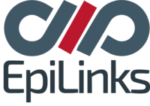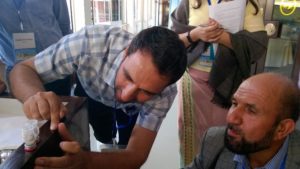SUPPORT FOR THE INTRODUCTION OF THE VACCINE AGAINST HUMAN PAPILLOMA VIRUS IN MAURITANIA
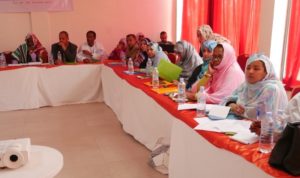
In Mauritania, tens of thousands of girls will soon be protected against cervical cancer
[bg_collapse view=”link-inline” color=”#ba152b” expand_text=”Show More” collapse_text=”Show Less” ]
Mauritania is committed to protecting tens of thousands of young girls from cervical cancer every year through vaccination against human papillomavirus.
EpiLinks supports the national immunization program to identify the most appropriate strategies for equitable and sustainable access to vaccination. The objective is that every girl in the country benefits from HPV vaccination, regardless of her level of education, her social status or her residential area.
We conduct a feasibility and acceptability study that will enable Mauritanian health authorities and partners defining optimal operational approaches for vaccination and communication strategy and activities. We support the country in developing the communication plan that considers the specificities of HPV immunization and the perceptions and practices of beneficiaries and stakeholders.
To implement this project, EpiLinks combines three main expertise: anthropology, communication for health and immunization systems. The team is composed of international and Mauritanian experts, specialized in reproductive health and introduction of new vaccines, and works closely with health authorities and partners, following international ethical standards in the social sciences research.
Client/Funder: GAVI The vaccine alliance
Project duration: 7 months (2018-2019)
Contact: Elise Guillermet
[/bg_collapse]
RAPID DIAGNOSTIC TESTS AND IMPLEMENTATION STRATEGIES IN THE CONTEXT OF THE DENGUE TEST AND VACCINATE STRATEGY: EXPERT MEETING REPORT
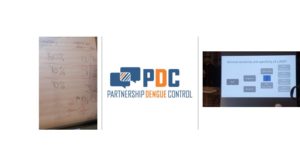
Brainstorming on dengue vaccination with CYD-TDV (Dengvaxia®)
[bg_collapse view=”link-inline” color=”#ba152b” expand_text=”Show More” collapse_text=”Show Less” ]
In January 2019, the Partnership for Dengue Control (PDC) and the Global Dengue and Aedes-transmitted diseases Consortium (GDAC) organized a 3-day experts’ workshop hosted by the Mérieux Foundation at Les Pensières, Annecy, France.
The meeting objectives were to:
- Assess rapid diagnostic tests (RDT) for screening for past dengue infection
- Discuss implementation strategies for pre-vaccination screening programmes for dengue vaccines
EpiLinks was responsible for collecting, synthesizing and organizing information delivered during presentations, country workshops and expert discussions, with the aim of producing a comprehensive report.
Client/Funder: Fondation Mérieux
Project duration: 2 months (2019)
Contact: Isabelle Delrieu
[/bg_collapse]
EVALUTATION OF STELAB, A SYSTEM FOR E-SURVEILLANCE OF MENINGITIS IN BURKINA FASO
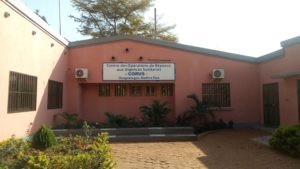
A new opportunity for connected and real-time case-based surveillance in African countries
[bg_collapse view=”link-inline” color=”#ba152b” expand_text=”Show More” collapse_text=”Show Less” ]
Burkina Faso is one of the countries in the African meningitis belt most affected by the disease.
Since January 2018, the country has put in place an electronic real-time and connected data management system for case-based meningitis surveillance (STELab), which integrates both the epidemiological and the laboratory data entered at district, regional and central levels.
EpiLinks has documented the STELab experience in Burkina Faso, with the objectives of describing the system, its implementation, and costs. The evaluation also addressed the keys to success and sustainability, as well as the potential for integration with other diseases and the conditions to be met for replicability in another country.
Client/Funder: WHO Geneva
Project duration: 4 months (2018-2019)
Contact: Isabelle Delrieu
[/bg_collapse]
TECHNICAL SUPPORT TO DENGUE VACCINE IMPLEMENTATION: INFORMATION FOR DECISION-MAKING
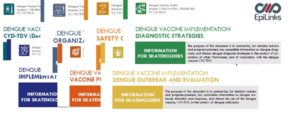
Since December 2015, dengue is a vaccine-preventable disease. What are the key factors to consider for vaccine introduction.
[bg_collapse view=”link-inline” color=”#ba152b” expand_text=”Show More” collapse_text=”Show Less” ]
The CYD-TDV vaccine (commercial name Dengvaxia®) is a dengue tetravalent vaccine (live attenuated), that has been licensed for the prevention of dengue in more than 20 countries in Latin America and Asia Pacific.
Based on the update label of the manufacturer and the revised WHO position paper on dengue vaccine, a pre-vaccination screening is now the recommended strategy for implementation.
EpiLinks has been involved in:
- Developing a new Toolkit to summarize key information to help decision makers and program planners (including Ministry of Health staff and NITAG1 members) make country decisions on dengue vaccine introduction
- Supporting an endemic Asian country workshop on dengue vaccine implementation strategies and impact
- Communicating lessons learned from previous introduction in public immunization programs (symposium and reports)
1 : National Immunization Advisory Groups
Client/Funder: Fondation Mérieux
Project duration: 6 months (2018)
Contact: Isabelle Delrieu
[/bg_collapse]
CASE STUDY: RESEARCH SHARING DURING CHOLERA OUTBREAKS

What were the key barriers and enablers to research data sharing during recent cholera epidemics in two West African countries
[bg_collapse view=”link-inline” color=”#ba152b” expand_text=”Show More” collapse_text=”Show Less” ]
Research data accessibility and sharing among stakeholders at the global, regional and field level, is essential to ensuring infectious disease outbreak preparedness and response. This is particularly true in the case of pathogens causing explosive epidemics, such as Vibrio cholerae.
EpiLinks conducted a retrospective case study on data sharing during cholera outbreaks in Côte d’Ivoire and Guinea.
Using in-depth interviews and a concise literature review, we documented and analysed practices and perceptions among stakeholders who were involved in surveillance, laboratory, and social sciences during preparedness and response to Cholera outbreaks.
The main objectives were to better understand:
- barriers and enablers to research data collection and sharing
- how data shaped research responses to these outbreaks
- the conditions for research data timeliness, accessibility, transparency, and quality
Client/Funder: Wellcome Trust
Project duration: 6 months (2018)
Contact: Elise Guillermet
[/bg_collapse]
WORKSHOP ON DENGUE VACCINATION IN THE CONTEXT OF A TEST-AND-VACCINATE STRATEGY, PARANA STATE, BRAZIL

Regional brainstorming for the development of guidelines for the implementation of the dengue vaccine
[bg_collapse view=”link-inline” color=”#ba152b” expand_text=”Show More” collapse_text=”Show Less” ]
The state of Paraná in Brazil has conducted community-based campaigns for dengue vaccination during 2016-2018.
Following the new Sanofi Pasteur product label and revised WHO position paper, a test-and-vaccinate strategy is now recommended for dengue vaccination.
Based on lessons learned in Paraná, and with support of national experts on public health, dengue vaccination and dengue diagnostic test, the workshop allowed generating information and guidelines with the aim to inform and advise the federal state on practical implementation of dengue vaccination in schools.
During this workshop held in November 2018 in Curitiba, EpiLinks was in charge of facilitation, development of information document and operational guidelines.
Client/Funder: Sanofi Pasteur
Project duration: 3 months (2018)
Contact: Isabelle Delrieu
[/bg_collapse]
A TOOLKIT FOR THE EYE STRATEGY
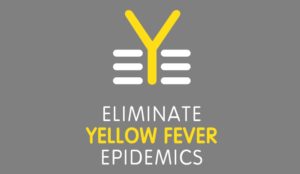
A tool to facilitate the implementation of the yellow fever strategy in high-risk countries
[bg_collapse view=”link-inline” color=”#ba152b” expand_text=”Show More” collapse_text=”Show Less” ]
The strategy to “Eliminate Yellow fever Epidemics” (EYE) is a comprehensive, multi-component approach aiming at addressing the emerging global threat due to yellow fever’s changing epidemiology, resurgence of mosquitoes and risk of international spread. EpiLinks contributes developing a toolkit for high-risk endemic countries to support the implementation of the EYE strategy. Twelve modules compile guidance notes, check lists and Gantt charts for preparing, implementing and monitoring EYE-related activities. This toolkit describes the three EYE objectives:
- Protect at-risk population (no epidemic)
- Prevent international spread (no exportation)
- Contain outbreak rapidly (no sustained transmission)
Client/Funder: WHO Geneva
Project duration: 4 mois (2018-2019)
Contact: Elise Guillermet
[/bg_collapse]
SIXTH INTERNATIONAL DENGUE INITIATIVE EXPERT MEETING FOR DENGUE VACCINE IMPLEMENTATION IN LATIN AMERICA

For a better understanding of the new recommendations for the dengue vaccine implementation
[bg_collapse view=”link-inline” color=”#ba152b” expand_text=”Show More” collapse_text=”Show Less” ]
The 6th Expert meeting on dengue vaccine implementation in Latin America was held June 22 and 23 2018 in Lima, Peru.
The meeting convened a permanent group of Latin America and other international experts on dengue and vaccination. This group was endorsed by the regional societies SLIPE (Latin American society of pediatric infectiology), ALAPE (Latin American association of pediatrics) and API (Pan American association of infectiology).
The meeting objective was to update the regional advisory group Position Paper on dengue vaccination in Latin America, based on new manufacturer product label and WHO recommendations, as well as discussions on relevant concepts, latest evidence, and implementing countries experiences.
EpiLinks participated in the meeting, summarized all the discussions and produced a full meeting report that was used to develop new IDI dengue vaccine recommendations.
Client/Funder: Sanofi Pasteur Colombia
Project duration: 2 months (2018)
Contact: Isabelle Delrieu
[/bg_collapse]
SUPPORT FOR THE INTRODUCTION OF ROTAVIRUS VACCINE INTO THE VACCINATION PROGRAM OF THE DEMOCRATIC REPUBLIC OF CONGO
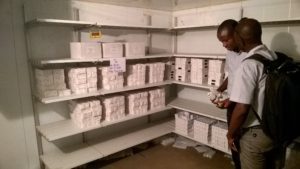
A logistical feasibility assessment
[bg_collapse view=”link-inline” color=”#ba152b” expand_text=”Show More” collapse_text=”Show Less” ]
The rotavirus vaccine prevents gastrointestinal infections, which are common causes of fatal diarrheal diseases in children. The DRC has decided to offer this vaccine to all children in the country.
EpiLinks has provided technical support to the RAVIN (Rotavirus vaccines Introduction Network) project led by JSI Research & Training Institute. The intervention consisted in assessing the logistical feasibility of introducing the vaccine by analyzing the capacity to store and transport rotavirus vaccines in the country. It identified needs for policy, staff capacity building, infrastructure and equipment to ensure the sustainable availability of a quality vaccine for every child in the country.
Client/Funder: JSI Research & Training Institute
Project duration: 3 months (2018)
Contact: Philippe Jaillard
[/bg_collapse]
COLLABORATIONS IN INITIATIVES LED BY OUR PARTNERS
[bg_collapse view=”link-inline” color=”#ba152b” expand_text=”Show More” collapse_text=”Show Less” ]
EpiLinks experts are regularly called upon to contribute to the success of our partners’ initiatives:
– Support for the preparation and implementation of 2 distance learning sessions for health practitioners in countries involved in immunization planning. The training aims to develop their capacity to plan WHO recommended transformative investments to improve the performance of routine immunization. This training was implemented by WHO in 2018.
– Technical support for the economic feasibility study for the establishment of a regional centre of excellence in health logistics in Asia. This study was conducted by GaneshAid with funding from Gavi. The research findings were used to develop original scenarios and models of support training structures for the region, providing stakeholders with detailed data for decision-making.
– Evaluation of the first regional course in vaccine and cold chain management. This training, funded by UNICEF and WHO, brought together experts from 8 South Asian countries. The evaluation, commissioned by UNICEF, noted the importance of this training and the need to implement a regional strategy for building the capacity of staff in the countries of the region.
Contact: Philippe Jaillard
[/bg_collapse]
